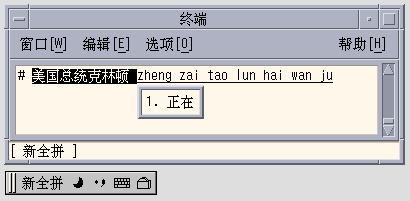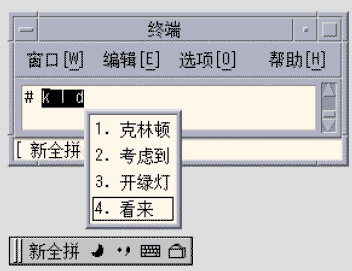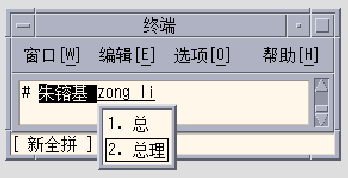Other Input Method Features
The NewQuanPin and New ShuangPin input methods provide support for other useful functionality.
Typing Long PinYin Strings
The New QuanPin input method accepts PinYin strings of up to 222 characters long. The following string is used in the next figure.
>>meiguozhongtongkelindunzhengzaitaolunhaiwanjushiwenti<< |

The result is the following Chinese string:
Note –
The New ShuangPin input method supports input strings of up to 30 characters.
Typing ShengMu
You can also type ShengMu only. Candidates are supplied for ShengMu, as shown in the following figure.

Entering GBK Hanzi
The zh_CN.GBK locale supports GBK by default, as shown in the following illustration:

The second Chinese character in the following figure is defined only in the GBK standard.
Single GBK candidates are placed at the end of the list of candidates. Press Return to scroll to the GBK area.
Tip –
For faster selection next time, you can define the GBK candidate as a phrase. For more information, see How to Define Phrases for Later Use.
Both New QuanPin and New ShuangPin support GBK Hanzi by default in the zh.GBK locale. However, because several Hanzi have the same ShengMu (the first part of PinYin), New QuanPin and New ShuangPin do not display GBK candidates if you provide only the ShengMu.
For example, typing the string rong will display GBK candidates because the string is a complete PinYin string. However, typing r alone will not display any GBK candidates because the string is only a ShengMu string.
- © 2010, Oracle Corporation and/or its affiliates
